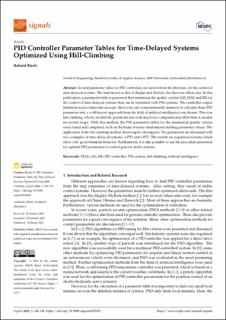Please use this identifier to cite or link to this item:
https://doi.org/10.21256/zhaw-24728Full metadata record
| DC Field | Value | Language |
|---|---|---|
| dc.contributor.author | Büchi, Roland | - |
| dc.date.accessioned | 2022-03-31T09:08:07Z | - |
| dc.date.available | 2022-03-31T09:08:07Z | - |
| dc.date.issued | 2022-03 | - |
| dc.identifier.issn | 2624-6120 | de_CH |
| dc.identifier.uri | https://digitalcollection.zhaw.ch/handle/11475/24728 | - |
| dc.description.abstract | Several parameter tables for PID controllers are known from the literature, for the control of time-delayed systems. The best known is that of Ziegler and Nichols, but there are others also. In this publication, a parameter table is presented that minimizes the quality criteria IAE, ITAE and ISE for the control of time-delayed systems that can be identified with PTn systems. The controller output limitation is also taken into account. Since it is very computationally intensive to calculate these PID parameter sets, a well-known approach from the field of artificial intelligence was chosen. This was hill-climbing, which can find the parameter sets with much less computational effort than is needed for nested loops. With this method, the PID parameter tables for the minimized quality criteria were found and compared, each on the basis of many randomized starting parameter values. The application of the hill-climbing method shows rapid convergence. The parameters are discussed with two examples of time-delayed systems: a PT3 and a PT5. The results are regulated systems which show very good transient behavior. Furthermore, it is also possible to use the procedure presented for optimal PID parameters to control general, stable systems. | de_CH |
| dc.language.iso | en | de_CH |
| dc.publisher | MDPI | de_CH |
| dc.relation.ispartof | Signals | de_CH |
| dc.rights | http://creativecommons.org/licenses/by/4.0/ | de_CH |
| dc.subject | Control theory | de_CH |
| dc.subject | Optimal parameter | de_CH |
| dc.subject | ITAE | de_CH |
| dc.subject | IAE | de_CH |
| dc.subject | Hill-climbing | de_CH |
| dc.subject | ISE | de_CH |
| dc.subject | PID controller | de_CH |
| dc.subject | PTn system | de_CH |
| dc.subject | Artificial intelligence | de_CH |
| dc.subject.ddc | 006: Spezielle Computerverfahren | de_CH |
| dc.subject.ddc | 510: Mathematik | de_CH |
| dc.title | PID controller parameter tables for time-delayed systems optimized using hill-climbing | de_CH |
| dc.type | Beitrag in wissenschaftlicher Zeitschrift | de_CH |
| dcterms.type | Text | de_CH |
| zhaw.departement | School of Engineering | de_CH |
| dc.identifier.doi | 10.3390/signals3010010 | de_CH |
| dc.identifier.doi | 10.21256/zhaw-24728 | - |
| zhaw.funding.eu | No | de_CH |
| zhaw.issue | 1 | de_CH |
| zhaw.originated.zhaw | Yes | de_CH |
| zhaw.pages.end | 156 | de_CH |
| zhaw.pages.start | 146 | de_CH |
| zhaw.publication.status | publishedVersion | de_CH |
| zhaw.volume | 3 | de_CH |
| zhaw.publication.review | Peer review (Publikation) | de_CH |
| zhaw.author.additional | No | de_CH |
| zhaw.display.portrait | Yes | de_CH |
| Appears in collections: | Publikationen School of Engineering | |
Files in This Item:
| File | Description | Size | Format | |
|---|---|---|---|---|
| 2022_Buechi_PID-Controller-Parameter_signals_MDPI.pdf | 1.36 MB | Adobe PDF |  View/Open |
Show simple item record
Büchi, R. (2022). PID controller parameter tables for time-delayed systems optimized using hill-climbing. Signals, 3(1), 146–156. https://doi.org/10.3390/signals3010010
Büchi, R. (2022) ‘PID controller parameter tables for time-delayed systems optimized using hill-climbing’, Signals, 3(1), pp. 146–156. Available at: https://doi.org/10.3390/signals3010010.
R. Büchi, “PID controller parameter tables for time-delayed systems optimized using hill-climbing,” Signals, vol. 3, no. 1, pp. 146–156, Mar. 2022, doi: 10.3390/signals3010010.
BÜCHI, Roland, 2022. PID controller parameter tables for time-delayed systems optimized using hill-climbing. Signals. März 2022. Bd. 3, Nr. 1, S. 146–156. DOI 10.3390/signals3010010
Büchi, Roland. 2022. “PID Controller Parameter Tables for Time-Delayed Systems Optimized Using Hill-Climbing.” Signals 3 (1): 146–56. https://doi.org/10.3390/signals3010010.
Büchi, Roland. “PID Controller Parameter Tables for Time-Delayed Systems Optimized Using Hill-Climbing.” Signals, vol. 3, no. 1, Mar. 2022, pp. 146–56, https://doi.org/10.3390/signals3010010.
Items in DSpace are protected by copyright, with all rights reserved, unless otherwise indicated.